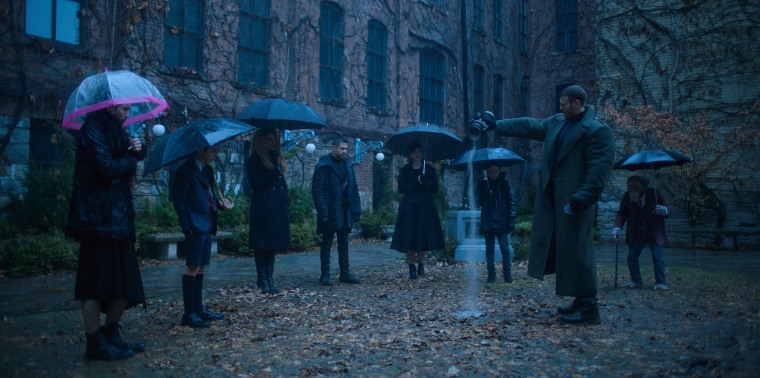“The Punisher” may not be officially dead yet, but the cancelation of “Daredevil” strongly suggests that Marvel’s Netflix project is coming to an end. But that doesn’t mean the streaming service is getting out of the superhero business, as proven by its new comic book adaptation, “The Umbrella Academy.” The series, from independent comic book publisher Dark Horse, does not follow in Marvel’s brooding footsteps, however, forging a goofier, weirder path. This is a superhero show that doesn’t take itself too seriously.
The original “Umbrella Academy” graphic novels were written by Gerard Way with illustrator Gabriel Bá. If the former name sounds vaguely familiar, it’s probably because Way was the lead singer of the popular band My Chemical Romance. While the show cuts the rock and roll backstories of some of its characters, the musical component of the original comics remains. This does make the series less gloriously insane than its source material, but for once, that's probably a good thing. Way, after all, began his career writing stories that could be told in four minutes or less. Instead, the show takes the best of Way’s ideas from two of the original comics (“The Umbrella Academy: Apocalypse Suite” and “The Umbrella Academy: Dallas”) and elongates them.
The joy of the “The Umbrella Academy” is that it takes traditional superhero tropes and reimagines them through a nihilistic, misanthropic lens.
The joy of the “The Umbrella Academy” is that it takes traditional superhero tropes and reimagines them through a nihilistic, misanthropic lens. In short, it looks at the narrative popularized by “The X-Men” — of mutant children raised in a special school — and then tries to figure out how badly that might harm the psyches of “gifted” children not necessarily thrilled about being drafted to save the world.
In Way’s world, the academy’s mutant children are part of a larger set: 43 children born miraculously at the same time across the world, to women who became pregnant and gave birth essentially instantaneously. But only seven of these miracle babies concern us, the ones bought up by eccentric billionaire and Umbrella Academy founder Sir Reginald Hargreeves (Colm Feore). Of those seven, only five have survived to adulthood, the ones known as Numbers 1-4 and Number 7. Hargreeves never bothered to learn their names, referring to them by numbers assigned in the order of how useful he found their mutant talents.
Number 1, also known as Luther, (Tom Hopper), for instance, has super strength. Number 7, known as Vanya (played by Ellen Page), is the odd child out, having never manifested any abilities. The missing family members are Number 5, whose ability to time travel accidentally backfired at the age of 13 and Number 6, who is dead — though no one will say how it happened.
Don’t be fooled, though. “The Umbrella Academy” initially sounds like a bleak “X-Men” knock-off, especially the part about digging into the childhood traumas of this not-so-merry-band-of-mutants. But those looking for a series that solemnly tackles themes like addiction or religious beliefs through the framework of a superhero lens will have to wait. “Umbrella Academy” is determined to have as much fun as Netflix will allow. Even Cameron Britton and Mary J. Blige, time-traveling serial murderers attempting to preserve the future from those who would alter it, join in the amusement.
SIGN UP FOR THE THINK WEEKLY NEWSLETTER HERE
The result is an oddly entertaining dichotomy. The show’s attitude is most reminiscent of Alan Moore’s “Watchmen,” with its dark outlook on humanity. But “Umbrella Academy” doesn’t want to get serious in the same way Moore did. “Watchmen’s” misanthropic superheroes were an allegory of the 1980s “greed is good” era and the rise of global fascism during President Ronald Reagan's presidency. Likewise, “The X-Men” takes the mutant children under the care of Professor X and turns their stories into parables about the dangers of bigotry. “The Umbrella Academy” takes its cast of characters and asks, “What if we had them dance to Tiffany?” (This is not to knock Tiffany. In fact, one of the show’s best moments of camerawork comes at the end of the musical sequence, which depicts each character privately dancing in their own room of the school as if it were a gigantic doll house.)
Speaking of musical sequences, it should probably not surprise anyone that a show based on a comic book written by a former rock star is musically oriented. Way is one of the show’s co-executive producers, and the show’s soundtrack is a major reason to recommend it. Even when the show drags — the ten episodes suffer from a mild case of Netflix bloat — there seems to always be a song to pep the proceedings up again, with bands ranging from the sprightly alternative They Might Be Giants to downtempo triphop mainstays like Morcheeba.
“The Umbrella Academy” is a welcome reminder that not all superhero stories have to wallow in their own nihilism. They can have fun with it! It also serves to remind audiences that interesting fables exist outside the Marvel and DC Comics canon. The Dark Horse catalogue, for example, has plenty of other gems if Netflix is willing to go spelunking. It’s high time we had more narratives that aren’t afraid of being silly in public, and that realize a little strangeness won't bring down the entire genre.

